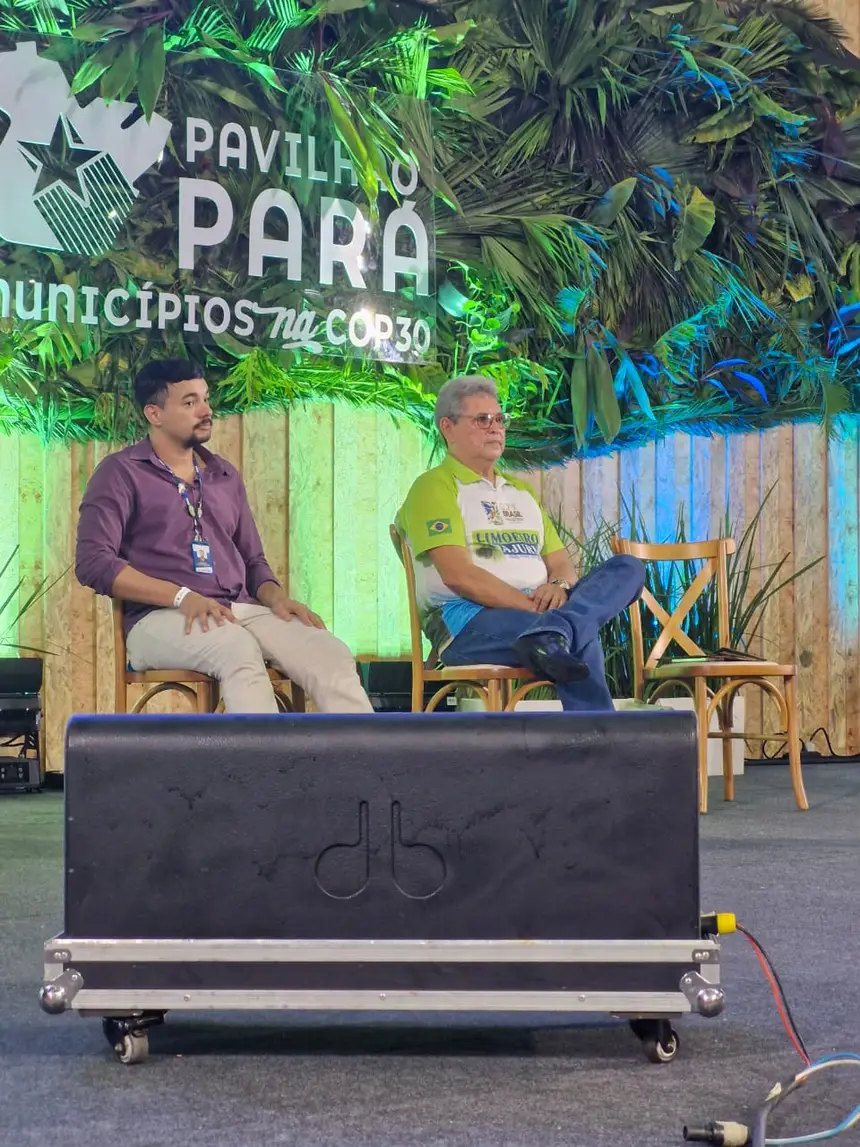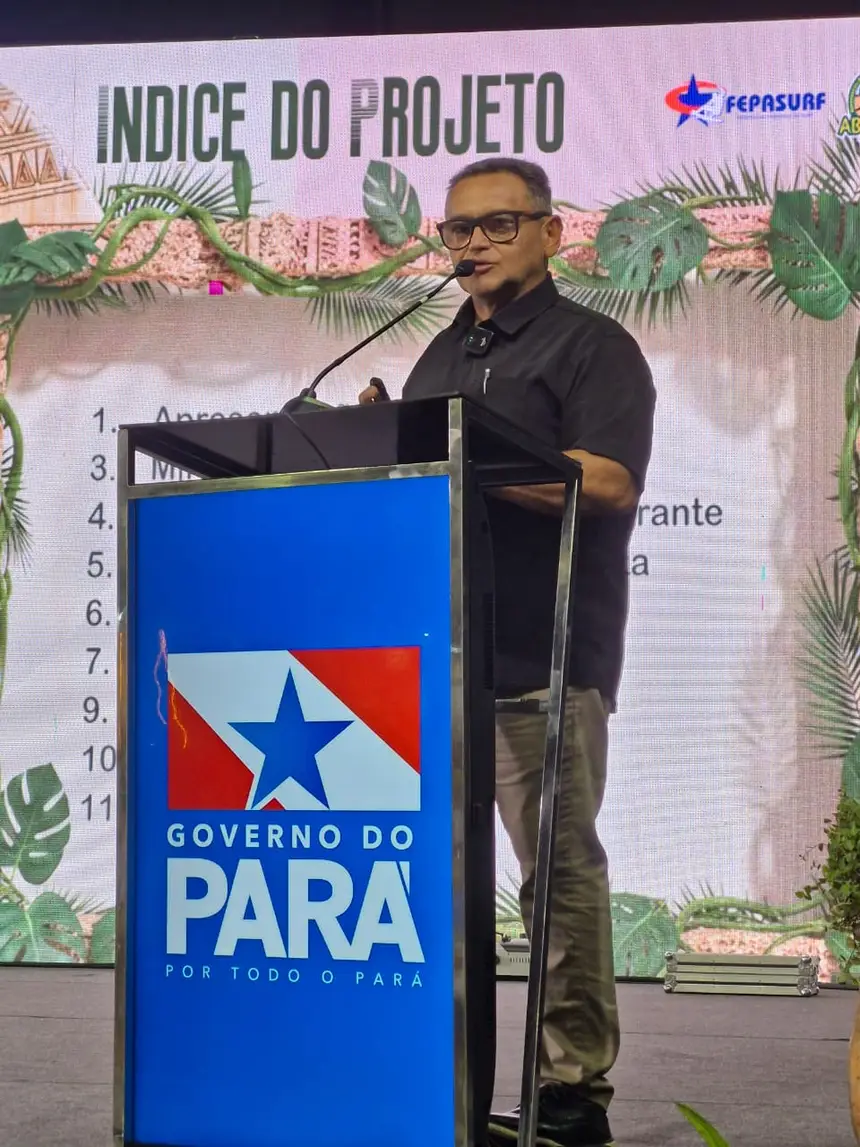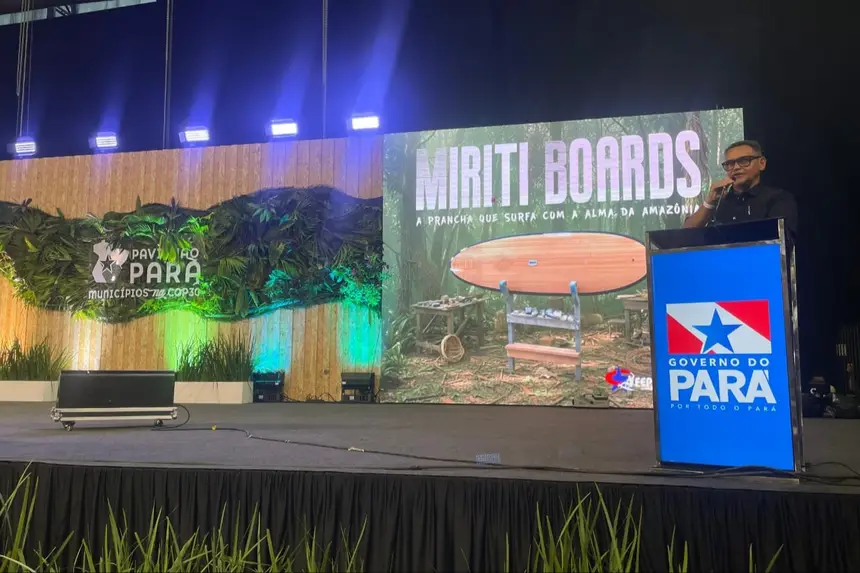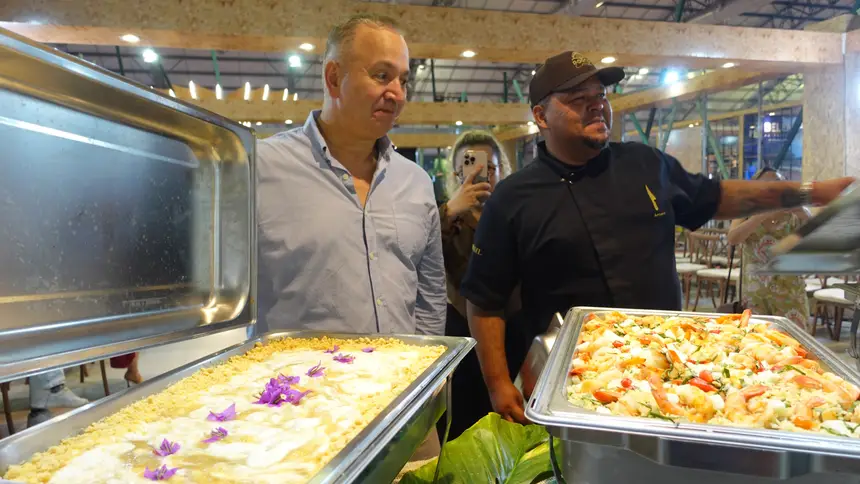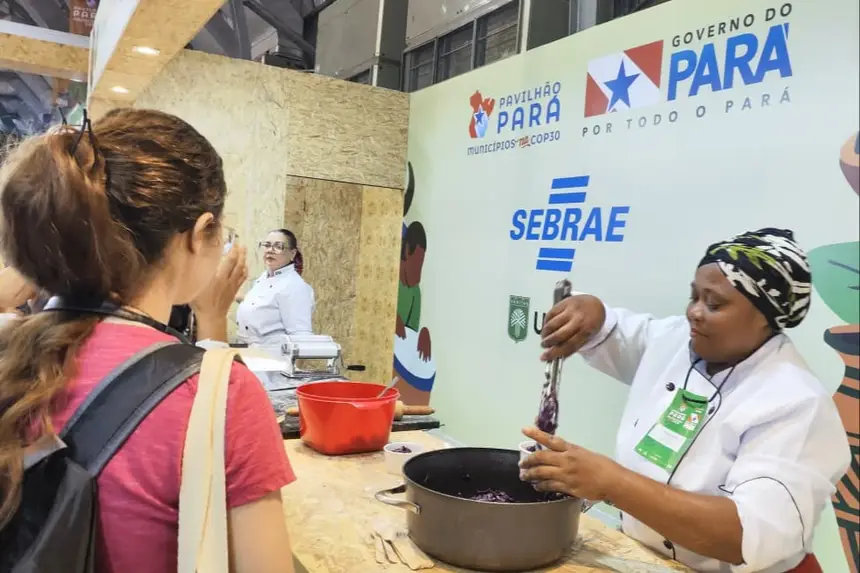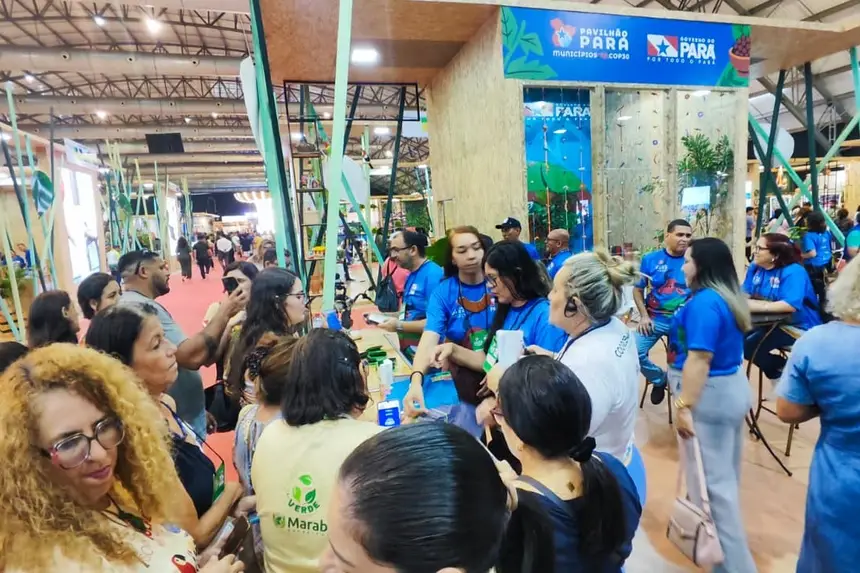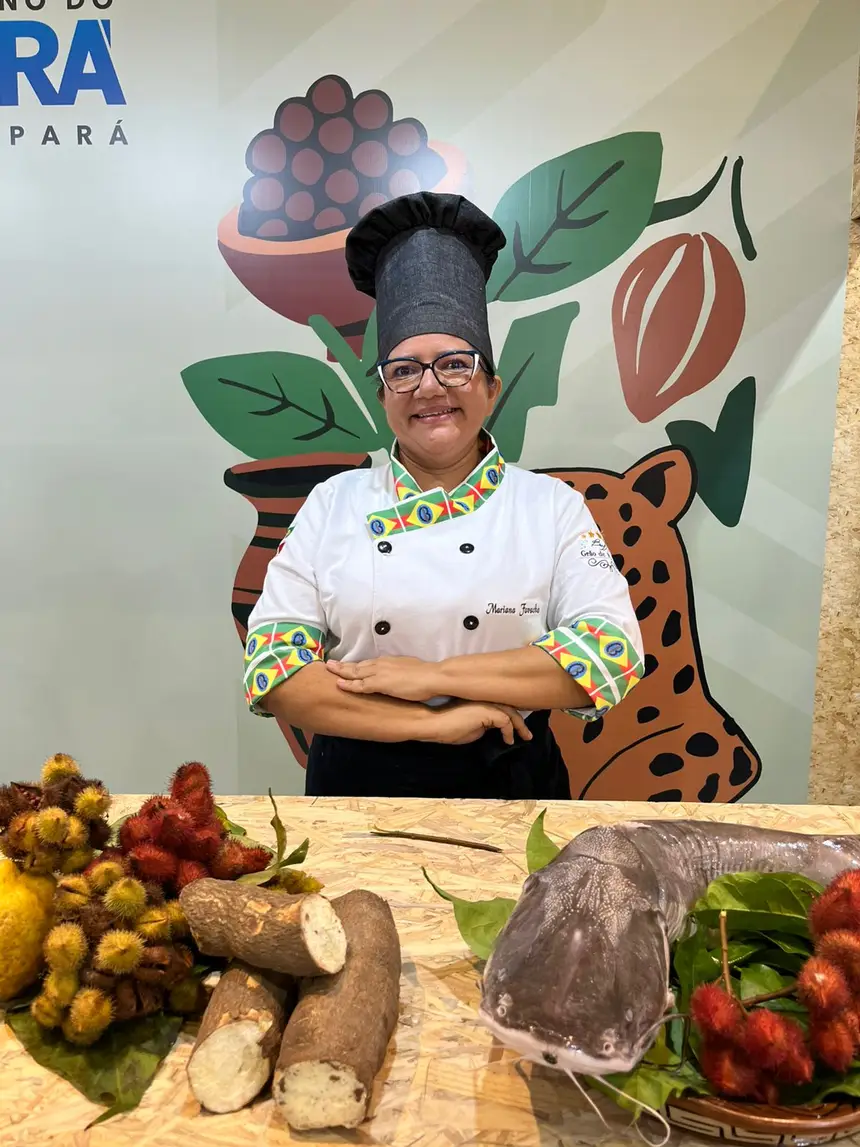Pavilion Pará expands discussions on environmental education, bioeconomy, and sustainable tourism
The second day of Pavilion Pará consolidated the cultural, gastronomic, and environmental diversity of the state, reinforcing its leading role at COP and showing that sustainable development, innovation, and tradition go hand in hand in the Amazon.
The second day of activities at Pavilion Pará Municipalities, on Tuesday (18), was marked by a robust technical program that brought together managers, researchers, and municipal leaders to discuss environmental education, bioeconomy, low-carbon policies, and innovation in Amazonian tourism.
The panel "The Amazon that Educates: Transformation through Awareness," featuring Marcel Assis (Semas-PA), Manoel Pantoja (Secretary of the Environment of Limoeiro do Ajuru), and Helena Cerqueira (Vice Mayor of Prainha), shared municipal and state experiences in building integrated policies for sustainability.
Marcel Assis contextualized the evolution of climate policies in the state. He recalled that "the context of Pará's climate policy began in 2020, with the enactment of the State Policy on Climate Change (PEMC)," which gave rise to new plans such as the State Plan Amazon Now. Marcel highlighted that Pará, which was among the states with the highest deforestation and greenhouse gas emissions, projected a reduction of about 40% in emissions following the implementation of the policy. According to him, the plan was structured around three pillars: command and control, environmental regulation, and low-carbon development, with bioeconomy gaining centrality in the latter.
"Bioeconomy has always existed; our traditional communities have always practiced it. What the State is doing now is highlighting these practices as a tool for strengthening these communities, recognizing nature-based solutions as a driver for keeping the forest standing," emphasized Marcel.
Next, Manoel Pantoja presented socio-environmental initiatives from Limoeiro do Ajuru, highlighting actions for animal protection, education, and community responsibility. He stated that "all lives impact our lives" and explained municipal programs such as the shelter and treatment center for stray animals and the installation of public water fountains. Manoel also emphasized the role of education as a transformative axis. "The environment belongs to all of us. The environment is us. If everyone does their part, we will have the healthy life we seek."
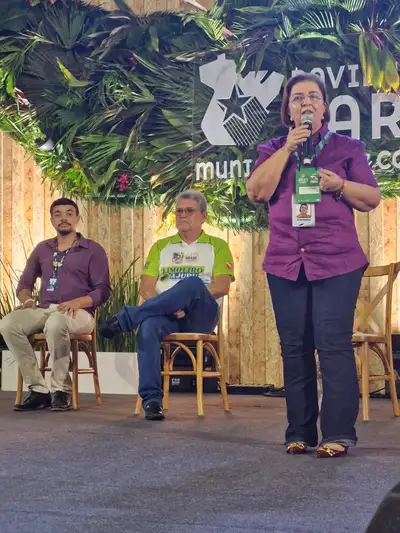
Meanwhile, Vice Mayor Helena Cerqueira shared the challenges and strategies of Prainha to tackle historical environmental issues, such as access to drinking water during the so-called "Amazon summer." She explained that the municipality was developing, in partnership with the Health Department, a project to revitalize water collection for human consumption, in addition to a set of nine projects seeking partnerships during COP. Helena stated that the goal is to "build a sustainable Prainha within our reality," reinforcing the role of environmental education in shaping new generations, worked through subjects focused on the environment.
Closing the technical program, the lecture "Force of the Pororoca: Nature, Culture, and Sustainable Tourism," with Noélio Sobrinho, president of the Pará Surf Federation, presented one of the most innovative projects of the day. Noélio announced that the Brazilian Surf Association of Pororoca (Abraspo) and the Federation would bring to COP the project that develops surfboards made 100% from Amazonian raw materials, in contrast to the current scenario where boards are mostly made from petroleum derivatives.
"We will produce completely natural boards in the Amazon. It is a revolution in the world of extreme sports," he stated. He highlighted that the project was born in 2016, in São Domingos do Capim, and united nature, culture, and innovation as pillars of sustainable tourism.
Show Kitchen
The program began with chef Arturo Báez from Parauapebas, who presented the traditional Bregão de Dois, highlighting the versatility of regional ingredients and the importance of promoting the cuisine of the interior of Pará in an international space like COP.
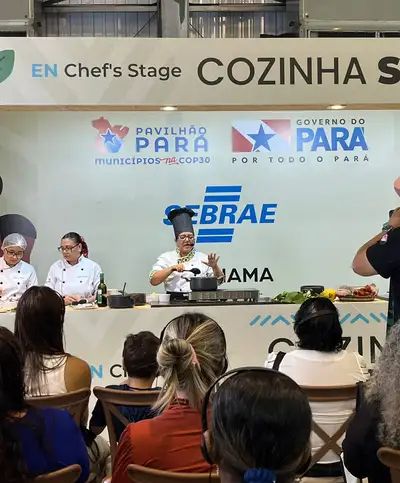
Next, chef Mariana Favacho from Barcarena led one of the most exciting demonstrations of the afternoon, preparing the Gourmet Broth of Gurijuba Head, a recipe that rescues affective memories and cultural practices from the riverside territory. Mariana emphasized that cooking at Pavilion Pará symbolized an act of collective representation.
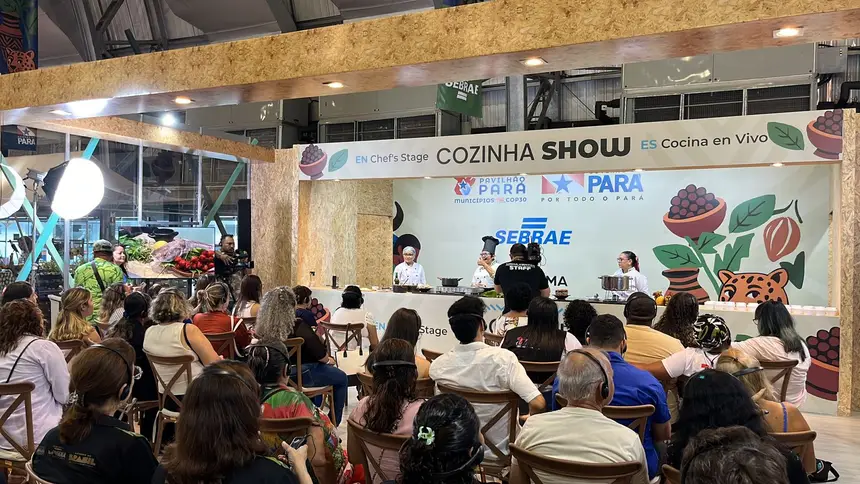
According to her, "it is not just a dish we are presenting. It is the story of a people who live from fishing, the tides, and family traditions. Bringing this to a global event is showing that the Amazon also expresses itself through food." The chef explained to the audience that the gurijuba, a fish widely consumed in the Lower Tocantins region, carries preparation techniques passed down through generations. "When I cook, I think of the women in my family, the cooks who came before me. It is a huge responsibility and pride to represent Barcarena and riverside cuisine," she added.
The afternoon continued with chef Luciene Sousa from Bujaru, who presented the dish Kings of the Amazon, combining flavors that symbolize strength, ancestry, and regional identity. Luciene highlighted the transformative role of the kitchen as a tool for visibility for smaller towns.
"Representing my state is priceless. It is a feeling that cannot be described. When I am here, I bring with me the name of Bujaru, I bring my story, I bring the people who believe in our work," she stated.
She reinforced that Amazonian cuisine is experiencing a moment of expansion and recognition, and that initiatives like Show Kitchen help strengthen local professionals. "We cook with truth, with ingredients from our land. It is a cuisine that speaks of who we are," she said.
Closing the day's program, chef Rosileia Ferreira from Acará presented the traditional Crureira Porridge, finishing the cycle of demonstrations with a dish marked by ancestry and the simplicity of flavors that have crossed generations in northeastern Pará.
Cultural Attractions
The cultural program completed the day with vibrant performances on the pavilion stages. The Cobra Grande Group from Borralhos, from Santo Antônio do Tauá, opened the activities bringing Amazonian mythical narratives.
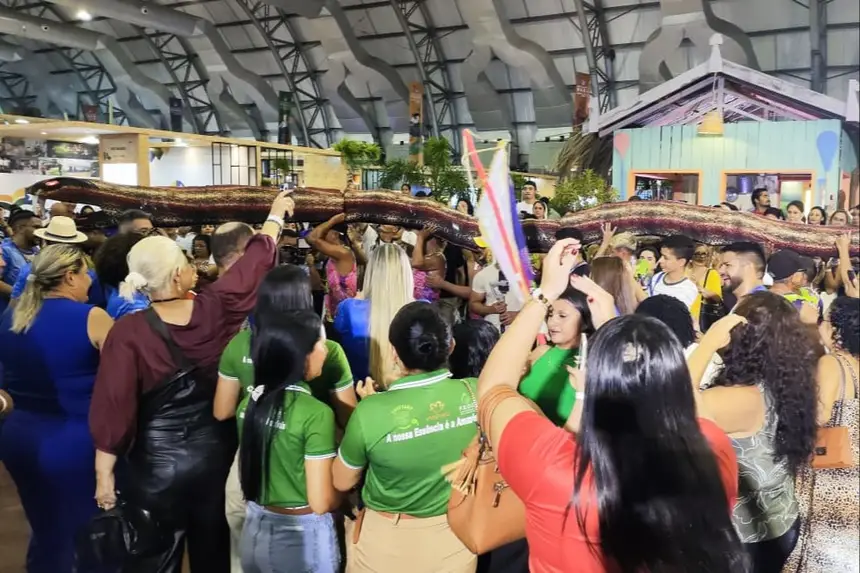
Next, the Encantos do Araí group from Augusto Corrêa brought traditional dances and expressions to the audience. Soon after, Jacy Farias and Nazareno Muniz from Barcarena animated the smaller stage with regional rhythms. The closing was by singer Claudio Jr. from Santarém, with a show that united music, emotion, and Pará identity.


